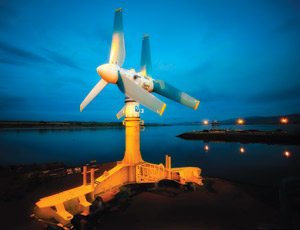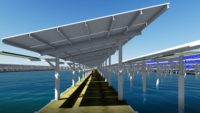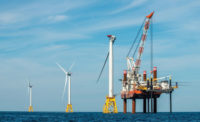Asia’s first large tidal energy farm will be deployed off the Indian state of Gujarat next year, under an agreement signed in January between state-owned Gujarat Power Corp. Ltd. and marine energy developer Atlantis Resources Corp., based in the U.K. and Singapore.


“Tidal energy represents a huge opportunity for us,” says D.J. Pandian, the power firm’s chairman and managing director. “This project will be India’s and Asia’s first at commercial scale, paving the way for similar developments within Gujarat.”
According to India’s Ministry of New and Renewable Energy, about 10,000 MW of tidal power exists in the state of Gujarat alone.
Atlantis will first deploy 50 MW in the Gulf of Kutch on India’s west coast in 2012. The turbine array will consist of 50 bottom-mounted turbines, each 1 MW in capacity. The first phase is expected to cost $150 million, according to Atlantis.
Continued development of the larger tidal farm will depend on the technical and economic success of the trial array. Under the pact between Atlantis and Gujarat, Atlantis could eventually deploy up to 250 MW of tidal power in the Gulf of Kutch and in the Gulf of Khambhat. The two sites have the potential to produce 700 MW, with maximum tidal speeds of 7-8 knots at a depth of 28 to 50 meters.
Front-end engineering and design is about to start on the project and will determine final project costs, says Tim Cornelius, CEO of Atlantis Resources. The company will also determine during the early-engineering phase whether it will install turbines on a monopole or on a gravity-based structure.
Atlantis will use its AK1000 turbine for the project, a tidal power turbine originally designed to survive the harsh conditions and strong tides found in Pentland Firth, off the coast of Scotland. “The main challenges will be shifting sands and the high silt content in the waters of the Gulf of Kutch, so work is being done on shaft seal design to prevent silt ingress,” Cornelius says.
The tidal turbines are installed at a maximum water flow, 5 m below the surface of the water. As with any offshore site, technical and environmental issues are bound to arise, says Cornelius. “The site has been chosen for its inherent suitability,” he adds.
Atlantis has committed to procuring 50% of the turbines from local sources, including the wind turbine blades that will be manufactured in India. Atlantis says it will start negotiations in the region for other contracts once preliminary design is concluded.
Lockheed Martin Electronic Systems will provide design services for the tidal power turbines, says Roger Rose, CEO of Lockheed Martin India. “This is just one more example of Lockheed Martin’s commitment to bringing cutting edge technologies to the Indian high-tech sector,” he says.





Post a comment to this article
Report Abusive Comment